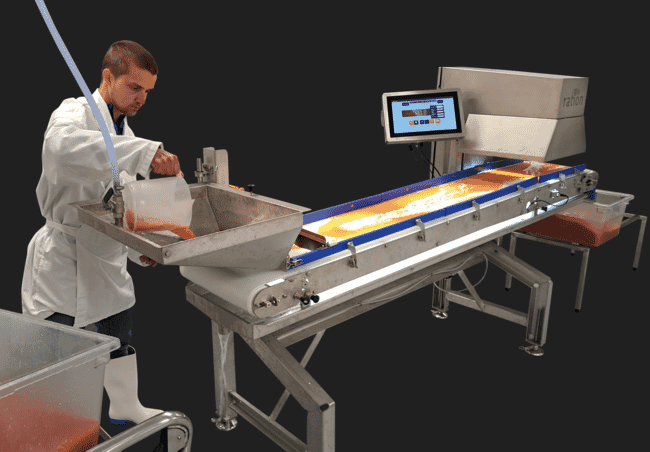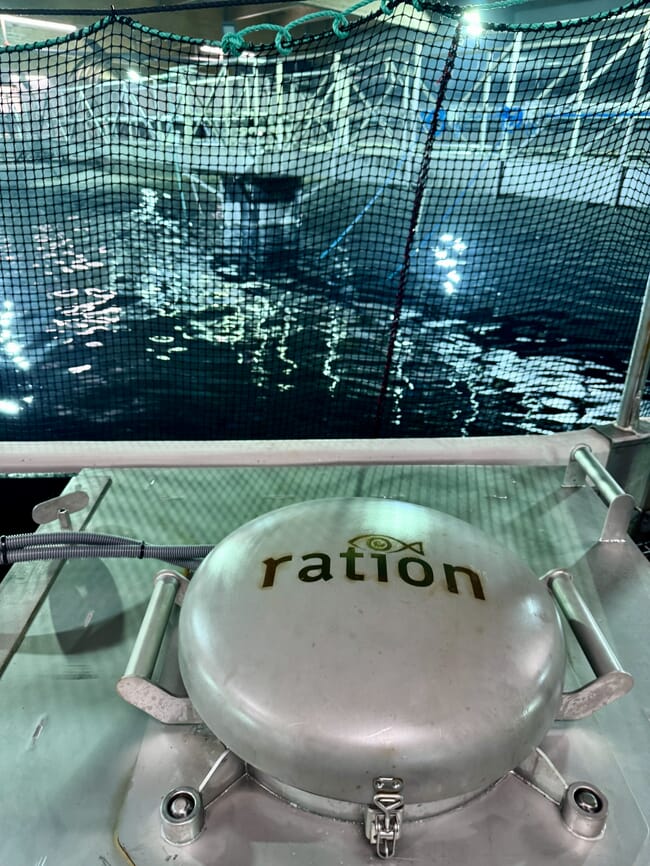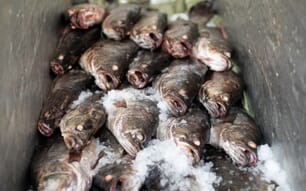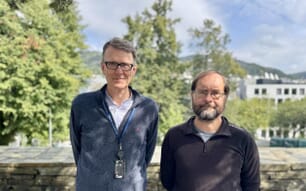
Hans Atlason is in the centre of the group © Ration
Behind the company is Hans Atlason, an electrical and computer engineer whose path from academia to aquaculture reflects a deep commitment to practical innovation.
“I wanted to turn the research I’d been working on in AI and computation into tangible solutions creating real-world value,” he recalls.
Following a PhD focused on developing novel methods for machine learning in computer vision, Atlason worked as a consultant, building bespoke computer vision systems for Icelandic manufacturers.
“Through that work, I learned about diverse applications of computer vision in industry and collaborated closely with Klaki – a company specialising in automation for the seafood sector,” he explains.
It’s a collaboration that eventually led to Atlason and Klaki co-founding Ration, with a sharp focus on aquaculture technology.
“Aquaculture felt like the perfect fit, as it is full of compelling use cases for computer vision,” Atlason reflects.
A two-pronged approach
So far Ration has succeeded in the development of two very different products: RationFeed and RationOva.
The former is a feeding automation system that uses computer vision to detect uneaten pellets exiting through effluent pipes in land-based fish farms.
“It counts uneaten feed pellets as they are exiting the effluent pipe to control feeding for optimal fish growth, feed efficiency and water quality,” explains Atlason.
The system is designed for clarity and reliability: it uses cameras that are mounted externally, avoiding common issues such as poor visibility in turbid water and corrosion from submersion.
“RationFeed is unique because it’s a non-submerged camera system. This ensures clear visibility even in challenging conditions and makes maintenance much easier,” Atlason explains.
The second product, RationOva, targets the precise counting and inspection of salmon eggs. Unlike traditional systems RationOva enables high-throughput of ova on a conveyor belt, significantly enhancing speed and accuracy – both in terms of the number and size of the eggs. And, by eliminating the need for manual volumetric counting, RationOva provides farmers with reliable data and remarkable precision
“We also store the image data from each session on the cloud, so customers have complete traceability and can verify the counts and quality checks themselves,” Atlason adds.

© Ration
Industry uptake
Both products have already found early adopters. RationFeed has been tested at several of Iceland’s leading land-based salmon farms, including Laxey and First Water, where it has evolved from its pilot phase to offer companies a fully autonomous option to optimise feeding for growth and feed efficiency. Meanwhile, RationOva is undergoing trials at Benchmark Genetics, one of the world’s leading names in salmon breeding.
“Early customers and collaborations have confirmed that the solutions are very accurate and stable over time, so now we are ready to expand,” Atlason notes.
From the outset, Ration’s technology and business case have drawn significant support.
“We got the largest grant awarded by the Icelandic Minister of Food, along with funding from the Technological Development Fund. That was a big validation for us and really helped fund the company,” Atlason says.
The startup has also benefited from its close ties with Klaki, which gives Ration access to a wide pool of mechanical and automation expertise.
“They do the mechanical design and manufacturing, while we handle the electronics and software. But really, we see them as part of the core team,” Atlason explains.

© Ration
A growing market
Ration appears to be entering the market at a particularly opportune time – given the rapid expansion of Iceland’s land-based salmon farming sector.
“There’s a real momentum here. Land-based farms are growing, and we’re seeing a trend where smolt are being raised longer on land before going to sea. That means better conditions for deploying our systems,” Atlason notes.
However, their next challenge is scaling.
“We’re currently raising investment to expand sales and grow the company,” Atlason confirms.
While he's cautious about sharing exactly how much they’re looking to raise, he’s clear about what kind of partners they’re looking for.
“It’s a plus if investors are connected to the salmon farming sector, as well as aligned in our mission to create intelligent solutions that make operations more efficient and sustainable, as that can lead to new opportunities and collaborations,” Atlason reflects.
As the company grows, Ration is also exploring how its technology might be applied more broadly. Though initially developed for salmon, Atlason notes that RationOva is well suited for any high-volume egg counting and quality inspection on conveyors.
“I think it would work well in other seafood industries – shrimp, shellfish, and so on,” he says.
One of the most compelling features of Ration’s systems is their level of intelligence. RationFeed, for example, doesn’t just count uneaten pellets – it also learns when to stop feeding automatically.
“The system can adapt feeding immediately to the appetite of the fish without the need for manual intervention,” Atlason explains.
The result is a system that not only reduces waste but supports healthier, more efficient fish growth.
“We want to help the industry learn how to raise salmon in optimal conditions. And we want to increase the margins for producers while doing that,” he adds.
With two tested products, major clients, grant funding and investor interest, Ration could well be poised to become a key player in aquaculture, especially with the continued growth of land-based, that’s being spearheaded by hybrid flow-through systems in both Iceland and Norway.
“It’s a very exciting time. We’ve built solid foundations, and now we’re ready to grow,” Atlason concludes.








